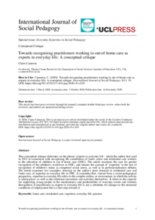Abstract
This conceptual critique elaborates on the phrase ‘experts in everyday life’, which the author first used in 2015 in connection with recognising the contribution of foster carers and residential care workers to the education of children in out-of-home care (OHC). The article examines the case for greater recognition of the children’s workforce in OHC, and situates the concept of ‘expertise’ in the rise of recognition of children’s status as competent social actors, as well as in professionalisation debates. The article examines two examples, drawing on the author’s prior research in residential care and foster care, of expertise in everyday life in OHC. It concludes that, viewed from a social pedagogical perspective, expertise in everyday life refers to the complex milieu, or environment, in which the activity is taking place, as well as the relational encounters and activities themselves. It refers to the capacity for supporting young people in the mundaneness and predictability of everyday events and routines. Recognition of practitioners as experts in everyday life is not a substitute for changes to the structural conditions of employment but is a first step towards it.

